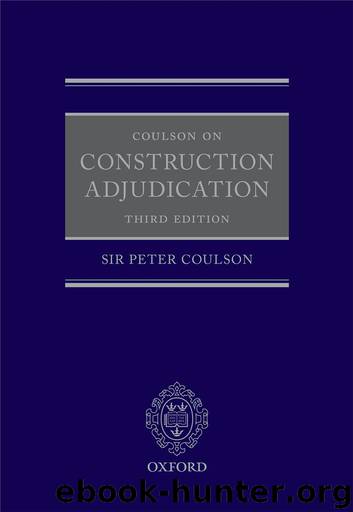Coulson on Construction Adjudication by Peter Coulson QC

Author:Peter Coulson QC [Coulson QC, Peter]
Language: eng
Format: azw3
Publisher: OUP Oxford
Published: 2015-03-26T04:00:00+00:00
Summary of Principles Relating to Jurisdiction
[7.131] The alleged absence of jurisdiction has, thus far, proved to be the most common ground on which a defendant relies to seek to avoid the decision of an adjudicator. Such a jurisdictional challenge must be taken expressly and clearly at the time of the appointment of the adjudicator. The adjudicator can investigate his own jurisdiction but, unless the parties have agreed otherwise, his ruling on his jurisdiction will not be binding and can be reviewed by the court. The appointment of the adjudicator must be valid and therefore in accordance, either with the 1996 Act, or the relevant contractual provisions. As to the dispute that the adjudicator decides, he only has jurisdiction to decide the dispute that is referred for decision by the notice of adjudication. Furthermore that dispute must have crystallised prior to the service of the notice of intention to refer, although the court will take a generous view as to whether or not it can be said that, at that date, a dispute had arisen. The dispute must be a single dispute although, again, the vast majority of disputes that arise in connection with construction contracts can be presented as a single dispute, even if they contain a whole series of diverse elements. It is important that the adjudicator does not trespass beyond the dispute that is referred to him. Thus, there must be a clear connection between the dispute that is referred to him and his ultimate decision. Moreover, the adjudicator must not go back over or reconsider any matters decided in earlier adjudications that have arisen under the same contract between the same parties. If the answer to a claim is the suggestion that it has already been compromised, then the adjudicator will investigate the substance of that challenge and rule on it. If he concludes that the claim has been compromised then he may have no jurisdiction, depending on the terms of the original contract and the terms of any second, settlement agreement. If the adjudicator concludes that the dispute has not been compromised and/or that the dispute as to settlement arises under a construction contract, or a contract that otherwise provides him with jurisdiction, he can decide the underlying dispute, although (if his jurisdiction continues to be challenged) his decision may then be subject to the review of the court on the enforcement proceedings.
[7.132] In Carillion Construction Ltd v Devonport Royal Dockyard Ltd232 the Court of Appeal cited with approval four general and five more specific propositions as to the jurisdiction of adjudicators that had been identified by Jackson J at first instance, at paragraphs 80 and 81 of his judgment. The four general propositions are set out at paragraph 52 of the judgment of Chadwick LJ and have been set out verbatim in paragraph 7.04 above. The five more specific propositions of Jackson J are repeated at paragraph 53 of the judgment of Chadwick LJ and have been set out verbatim at paragraphs 4.78 and 4.98 above.
Download
This site does not store any files on its server. We only index and link to content provided by other sites. Please contact the content providers to delete copyright contents if any and email us, we'll remove relevant links or contents immediately.
The Social Psychology of Inequality by Unknown(3018)
The Plant Paradox by Dr. Steven R. Gundry M.D(2611)
The Writing on the Wall by Anselm Jappe(2039)
Working for Yourself by J.D. (Nolo) Stephen Fishman(1864)
Get What's Yours for Medicare by Philip Moeller(1680)
Every Landlord's Legal Guide by Janet Portman & Stewart Marcia & Ralph Warner(1663)
The First 20 Hours: How to Learn Anything ... Fast by Kaufman Josh(1661)
ADHD on Trial by Michael Gordon(1573)
Decisive by Chip Heath(1561)
Working for Yourself by Stephen Fishman J.D. (Nolo)(1525)
Drafting Contracts: How and Why Lawyers Do What They Do, Second Edition by Stark Tina L(1494)
A Practical Guide to International Arbitration in London by Hilary Heilbron(1434)
The Lord of the Rings: The Fellowship of the Ring, the Two Towers, the Return of the King by J. R. R. Tolkien(1430)
Restitution by Restitution(1424)
The Economist Aug 8th 2015 by The Economist(1421)
Intellectual Property Strategy by John Palfrey(1419)
The Economist Aug 29th 2015 by The Economist(1387)
Collusion by Luke Harding(1315)
Persuasion by Owner(1293)
